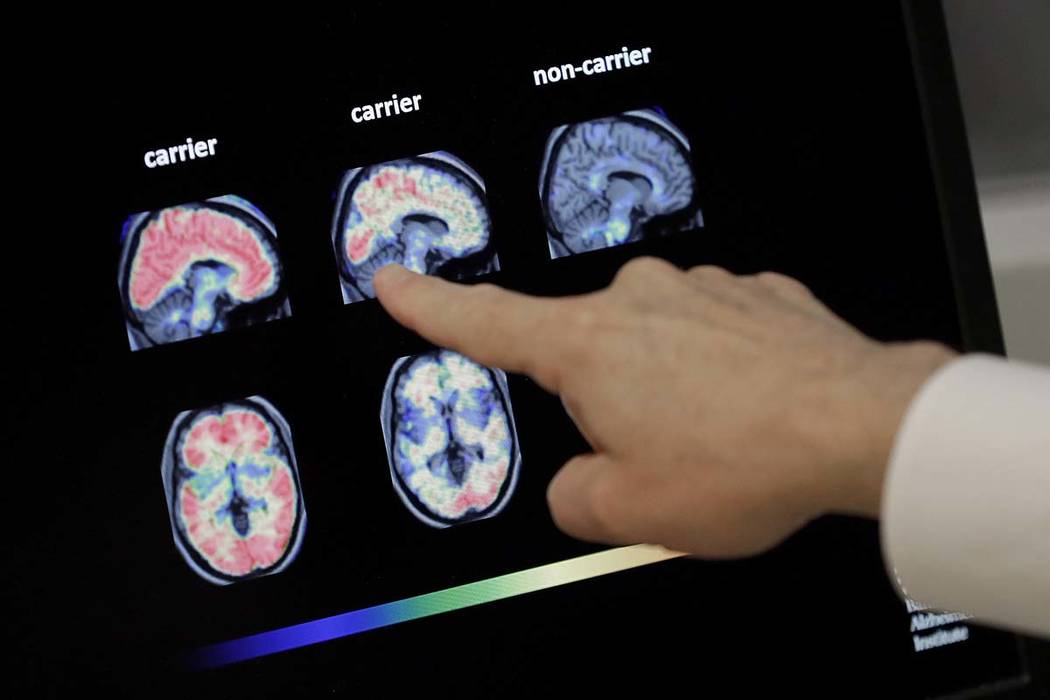Developer of Alzheimer’s disease drug to seek FDA approval
Biogen Inc. said Tuesday it will seek federal approval for a medicine to treat early Alzheimer’s disease, a landmark step toward finding a treatment that can alter the course of the most common form of dementia.
The announcement was a surprise because the drug company earlier this year stopped two studies of the drug when partial results suggested it was not likely to be successful. The company said a new analysis of more results suggest that the drug helped reduce a decline of thinking skills at the highest dose.
The drug, called aducanumab, aims to help the body clear harmful plaques from the brain. Cambridge, Massachusetts-based Biogen is developing it with a Japanese company, Eisai Co. Ltd.
More than 5 million people in the United States and millions more worldwide have Alzheimer’s. Current drugs temporarily ease symptoms and do not slow the loss of memory and thinking skills. Dozens of efforts to develop a drug to slow or reverse the course of the disease have failed.
The two studies tested aducanumab, given as monthly infusions, in more than 3,000 patients with mild cognitive impairment or early dementia from Alzheimer’s. The company said Tuesday that in one study, those given a high dose showed 23 percent less decline on one measure of thinking skills and smaller declines on other measures.
The company said more details would be given at a conference in December, including on safety. The company said the most common side effects were inflammation in the brain, most of which did not cause symptoms or lasting problems, and headaches. The brain inflammation has been seen in other studies of Alzheimer’s medicines that target the brain plaques.
“We’re really encouraged by the information that they’ve provided today,” the largest benefit so far for any experimental medicine, said Rebecca Edelmayer, a scientist at the Alzheimer’s Association, which had no role in the studies.
The Cleveland Clinic Lou Ruvo Center for Brain Health in Las Vegas participated in the study in which the high doses of aducanumab were given.
“Our sense from the study was that people were stabilizing, that they were not getting worse,” said Dr. Aaron Ritter, the center’s director of clinical trials. Because it was a double-blind study, doctors at the Ruvo Center did not know who was receiving the drug and who was receiving a placebo.
“We were devastated when we found they were actually stopping the study early,” continued Ritter, who described Tuesday’s announcement as “great news.”
“The findings are still preliminary, and we’re still waiting to hear exactly what the outcome of the study was,” he said. “We’re cautiously optimistic that this is a sign of our first breakthrough. It just comes in a very unusual manner.”
Biogen said it would offer aducanumab now to patients enrolled in these and earlier studies of it, including the nine patients who participated in the study at the Ruvo Center.
Biogen shares were up more than 26 percent to $281.87 Tuesday, but some on Wall Street remained skeptical.
Mizuho Securities USA analyst Salim Syed said he wants to know more about the FDA’s involvement in Biogen’s decision. He also said in a research note that it’s still just a hypothesis that removing beta amyloid plaques can benefit Alzheimer’s patients.
The company’s announcement “does not guarantee approval and questions remain,” he said.
Review-Journal reporter Mary Hynes contributed to this report.


















